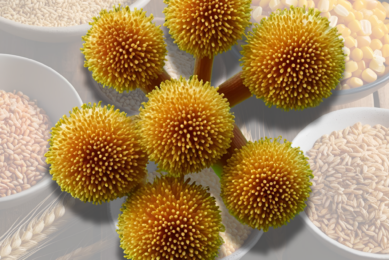Research: Mycotoxin in corn and effect yeast cell wall extract
Grain fed calves were used to determine effects of feeding corn diets naturally contaminated with Fusarium mycotoxins and/or a modified yeast cell wall extract (YCW) on performance, immunity and carcass characteristics.
Thirty-two grain-fed veal calves were fed one of four dietary treatments in individual pens for at least 84 days either:
(1) control corn + supplemental pellet (CC),
(1) control corn + supplemental pellet (CC),
(2) control corn + YCW supplemental pellet (CY),
(3) mycotoxin contaminated corn + supplemental pellet (MC), and
(4) mycotoxin contaminated corn + YCW supplemental pellet (MY).
Diets consisted of 750 g/kg whole corn grain and 250 g/kg supplemental pellet with corn as the source of food-borne mycotoxins.
The major contaminants present in the contaminated diets (average concentrations of MC and MY) were deoxynivalenol (DON; 10.27 mg/kg), 15-acetyl DON (1.27 mg/kg) and zearalenone (1.84 mg/kg).
Results
Final BW and total BW gain of the calves were not different between treatment groups. However, ADG tended to be higher and F:G was decreased in calves fed contaminated diets.
Haptoglobin, fibrinogen and IgA concentrations did not differ between treatments.
Concentrations of IgG were lower in calves receiving YCW.
Plasma urea N and glucose concentrations were increased and decreased, respectively, in calves fed contaminated diets.
The weights (g and g/kg BW) of the liver, kidney, heart and lungs did not differ between treatments. Carcass traits were also not different between treatments.
These data indicate that veal calves are able to tolerate a moderate feeding level of corn grains naturally contaminated with Fusarium mycotoxins and that small improvements in F:G occurred.
As there were generally no negative effects of dietary mycotoxin on performance, the efficacy of YCW as a mycotoxin adsorbent could not be assessed, but YCW alone had minimal effects on performance.
The full research can be obtained at ScienceDirect











